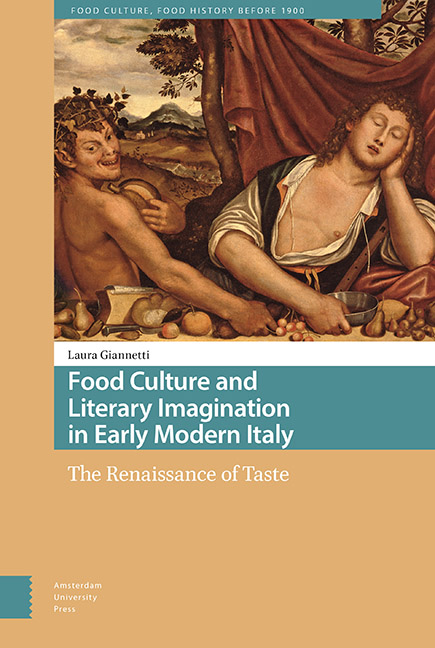Summary
Abstract
This study – which emerged from a casual interest in apparently insignificant accounts of dinners and dining in Italian Renaissance comedies – reveals and subjects to thematic and theoretical analysis the complex and conflicted world of food culture in sixteenth-century Italy as it developed in a wide range of literary texts. The literary imagination is here reconsidered from the perspective of food culture, a lens that exposes what I argue is a circular model of food and literary production in which practice influences both imagination and literature, which in turn impact the world of everyday life. The literary imagination of food thus becomes not only a way of exploring changes in the understanding of food and the notion of taste but also a driving force behind the Cinquecento turn that took place in both literature and food culture of the period.
Keywords: food, taste, literature, Cinquecento, appetito, gusto
Over the last thirty years, the study of food, eating, and food culture in early modern Italy has become an exciting and significant new item on the scholarly agenda of historians, art historians, and literary critics. A summary of the evolution of this vast and rapidly changing field – which began in the 1960s and 1970s as a fairly traditional history of food and agriculture but is continuously emerging as a much more wide-ranging and inclusive material and cultural history – is beyond the scope of either this book or its brief introduction. What I offer here instead is a brief account of the paths that led me, in the course of a career spent reading Italian Renaissance literature, to write about the Renaissance of taste as it appears in the literary imagination of sixteenth-century Italian authors.
My interest in this topic emerged from an intensive and extensive, if not nearly exhaustive, reading of Italian Renaissance comedies – both the well-known and the virtually unknown – undertaken as research for my first book, Lelia's Kiss: Imagining Gender, Sex, and Marriage in Italian Renaissance Comedy. Many of these comedies present a scene in which, around tables set for dinner, parasites, servants, lower-class characters, and old men in love discuss the properties and attractiveness of certain foods or dream of enjoying feasts of impressive abundance.
- Type
- Chapter
- Information
- Food Culture and Literary Imagination in Early Modern ItalyThe Renaissance of Taste, pp. 11 - 28Publisher: Amsterdam University PressPrint publication year: 2022

